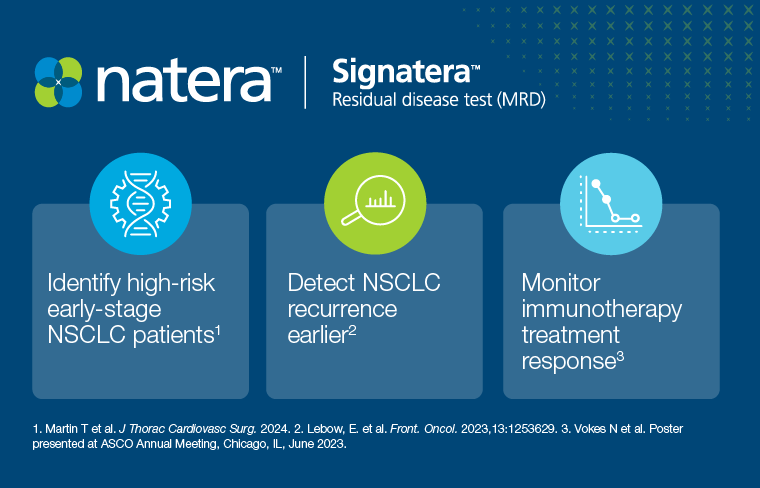Sponsored Content
Signatera™: Transforming the management of NSCLC with personalized ctDNA MRD testing. Explore how Signatera™ can inform NSCLC treatment strategy across early stage and metastatic disease.

As pioneers and trusted leaders in the MRD testing space, Signatera™ has been characterized in >85 peer-reviewed publications and with >200K patients tested. With this unrivaled clinical validation and real-world experience, clinicians can feel confident with the accuracy and reliability of a Signatera™ result.
In NSCLC, the Signatera™ tumor-informed MRD assay is leading the way as the most clinically validated assay with six peer-reviewed publications and numerous presentations at medical conferences.
There are several key clinical questions that Signatera™ can help address:
How do you determine which early-stage NSCLC patients should receive adjuvant therapy?
- Guidelines provide the option of either treatment or observation for stage IB-IIA patients and 30-76% of NSCLC patients will recur post-definitive treatment1
- Serial Signatera™ ctDNA monitoring can identify high risk patients and help inform adjuvant treatment strategy
- Signatera™ was evaluated in Martin et al 2024, a study in patients with stage I-II resectable NSCLC after surgical resection and during surveillance2
- Signatera™-positive patients had a 27x higher risk of recurrence than Signatera™-negative patients (HR: 53; 95% CI)
- Signatera™ was evaluated in Lebow et al 2023, a study in patients with stage I-III unresectable NSCLC after definitive radiation therapy and during surveillance3
- ctDNA detection post-radiation was the only significant prognostic factor associated with PFS (HR: 13.4; p=0.02)
How do you identify recurrence early, before it shows up on imaging?
- Imaging may be inadequate to identify recurrence or progression early
- Across multiple clinical validation studies (Martin et al, 2024; Lebow et al 2023), Signatera™ identified recurrence with a lead time up to 5.5 months before imaging-confirmed recurrence2–3
Which 1L metastatic NSCLC patients may be candidates for early treatment escalation?
- Signatera™ was evaluated in the EMPOWER Lung-1 trial, a prospective study in patients with advanced or metastatic NSCLC randomized to ICI (cemiplimab) vs chemotherapy for 1L treatment 4
- Early Signatera™ ctDNA dynamics were predictive of PFS & OS in NSCLC patients treated with Immunotherapy
- Rising ctDNA levels by week 3 or lack of ctDNA clearance by week 9 identified patients with inferior outcomes. Is this a group that could potentially benefit from early treatment escalation?
References:
- 1. NCCN Clinical practice guidelines in Oncology for NSCLC. V8 2024
- 2. Martin T et al. J Thorac Cardiovasc Surg. 2024
- 3. Lebow, E. et al. Front. Oncol. 2023,13:1253629.
- 4. Vokes N, et al. Circulating Tumor DNA (ctDNA) Dynamics and Survival Outcomes in Patients with Advanced NSCLC and High (>50%) PD-L1 Expression, Randomized to Cemiplimab vs Chemotherapy. Presented at ASCO Annual Meeting, Chicago, IL, June 2023.

